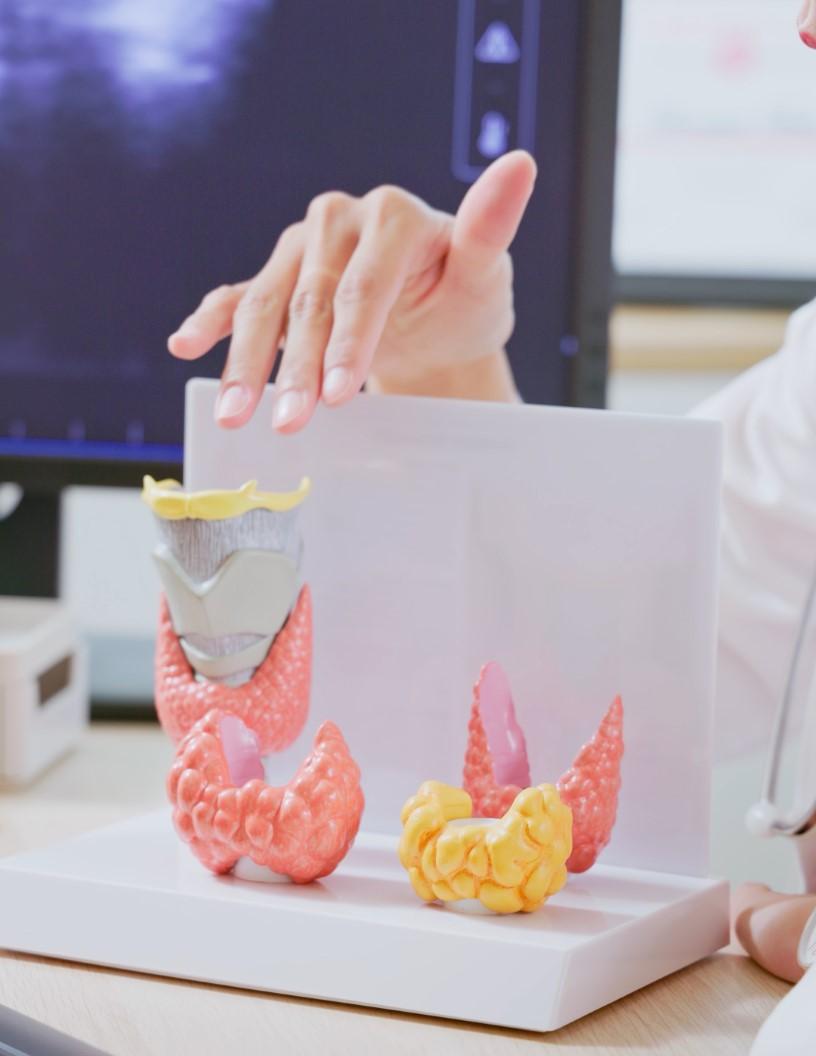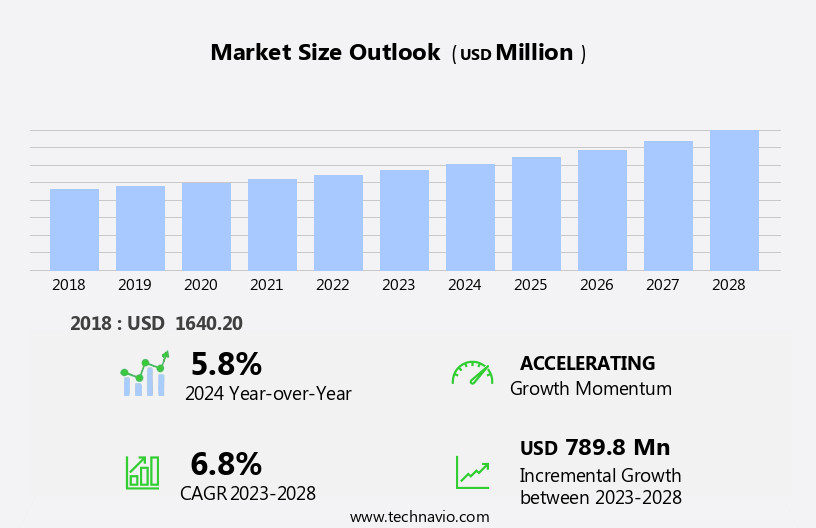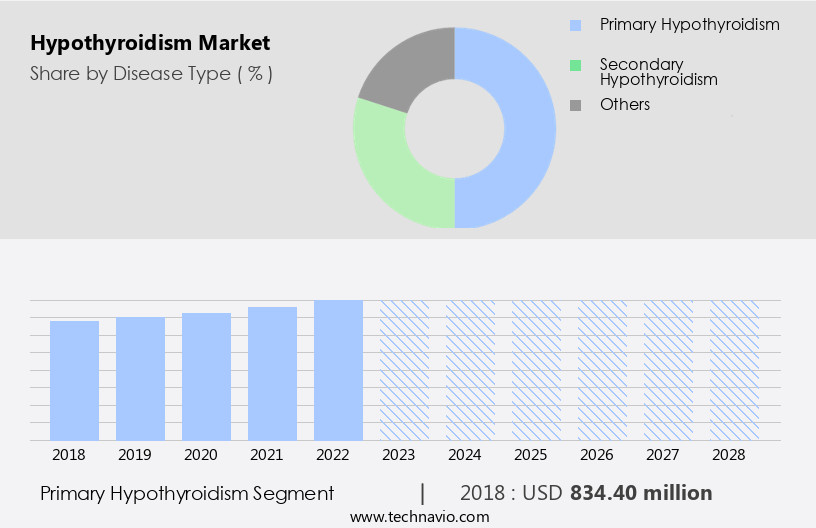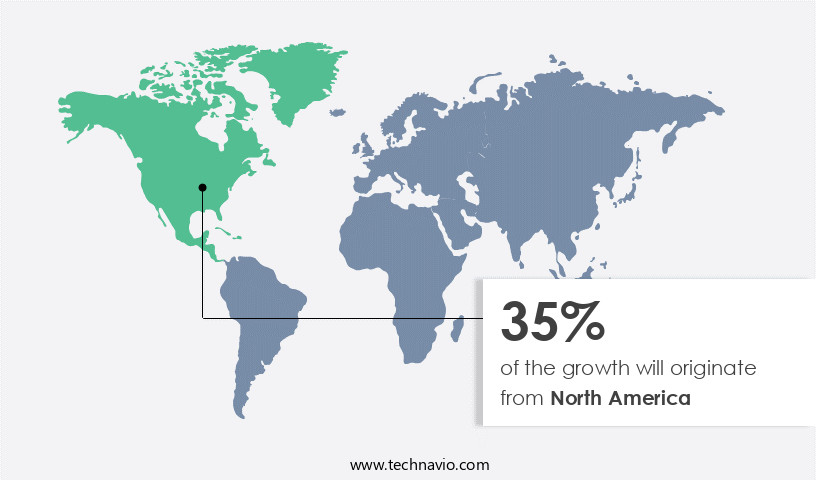Hypothyroidism Market Size 2024-2028
The hypothyroidism market size is forecast to increase by USD 789.8 million at a CAGR of 6.8% between 2023 and 2028.
- The market is experiencing significant growth due to the increasing approval of new drugs for the treatment of hypothyroidism. This trend is driven by the unmet medical needs and the rising prevalence of hypothyroidism, particularly in developing regions. Moreover, market players are adopting inorganic growth strategies such as mergers and acquisitions to expand their product portfolios and strengthen their market positions. However, the market faces challenges, including the risk of product recalls due to quality issues and regulatory scrutiny. Companies seeking to capitalize on market opportunities must focus on ensuring product safety and regulatory compliance while also investing in research and development to bring innovative treatments to market.
- By addressing these challenges and leveraging growth strategies, market participants can effectively navigate the competitive landscape and capture market share in The market.
What will be the Size of the Hypothyroidism Market during the forecast period?
- The market in the US represents a significant and growing sector within the healthcare industry. Hypothyroidism, a medical condition characterized by an underactive thyroid gland, affects various body parts and functions, including metabolism, body temperature regulation, and energy levels. Primary and secondary forms of hypothyroidism, resulting from thyroid gland dysfunction or pituitary gland malfunction, respectively, are common causes of this condition. Symptoms such as cold sensitivity, hair loss, weight gain, weakness, fatigue, dry skin, and constipation can indicate hypothyroidism. Treatment typically involves oral administration of thyroid hormones, such as triiodothyronine (T3) and thyroxine (T4), and in some cases, drug combinations of these hormones.
- Diagnosis and treatment of hypothyroidism are crucial, as undiagnosed patients may experience long-term health complications. Market growth is driven by the increasing prevalence of thyroid disorders, advancements in diagnosis and treatment methods, and disease awareness campaigns. Robotic energy-based therapies and thyroid-stimulating hormone (TSH) testing are emerging trends in the hypothyroidism treatment market. The market is expected to continue growing due to the rising number of patients with thyroid disorders and the ongoing development of innovative treatment options.
How is this Hypothyroidism Industry segmented?
The hypothyroidism industry research report provides comprehensive data (region-wise segment analysis), with forecasts and estimates in "USD million" for the period 2024-2028, as well as historical data from 2018-2022 for the following segments.
- Disease Type
- Primary hypothyroidism
- Secondary hypothyroidism
- Others
- Distribution Channel
- Hospital pharmacy
- Retail pharmacy
- Online pharmacy
- Geography
- North America
- US
- Canada
- Europe
- France
- Germany
- Italy
- UK
- Asia
- China
- India
- Japan
- Rest of World (ROW)
- North America
By Disease Type Insights
The primary hypothyroidism segment is estimated to witness significant growth during the forecast period.
Primary hypothyroidism is a medical condition characterized by an underactive thyroid gland, resulting in insufficient production of thyroid hormones, primarily Thyroxine (T4) and Triiodothyronine (T3). The causes of primary hypothyroidism can be classified into three main categories: autoimmune disorders, iodine deficiency, and other less common factors. Autoimmune thyroiditis, particularly Hashimoto's disease, is the most common cause in iodine-sufficient regions, including the US. In contrast, iodine deficiency remains the leading cause in areas with insufficient iodine intake. Other less common causes include congenital factors, certain medications, medical treatments, and infiltrative diseases. Secondary hypothyroidism occurs when the thyroid gland fails to function properly due to pituitary or hypothalamic dysfunction.
Tertiary hypothyroidism, also known as tertiary syphilis, is a rare form caused by a tertiary stage of syphilis infection. The symptoms of hypothyroidism can vary widely and may include weakness, fatigue, memory impairment, stiffness, muscle aches, weight gain, cold sensitivity, dry skin, hair loss, mood swings, constipation, depression, and impaired concentration. Diagnosis involves a combination of clinical evaluation, laboratory procedures, such as Thyroid Function Tests, Thyroid ultrasound, Thyroid scintigraphy, and Thyroid antibody exam. Inmarket drugs like Levothyroxine and Liothyronine are commonly used for treatment, while late-stage pipeline drugs are under development to address unmet medical needs. Lifestyle modifications, such as dietary iodine supplementation and stress management, can also help manage symptoms.
Robotic Energy-Based Therapies are being explored as potential treatment options for hypothyroidism. The market is driven by the increasing prevalence of the disease, particularly in iodine-deficient regions, and the growing awareness of the condition. According to , the global prevalence of hypothyroidism is estimated to be around 4.6% of the population, with a significant number of cases remaining undiagnosed. The market is expected to grow due to the increasing demand for effective treatments and the development of new drugs and therapies. The diagnosis and treatment of hypothyroidism involve a thorough medical history, physical examination, and various laboratory tests.
Drug combinations, such as Thyroid hormones and Thyroid-stimulating hormone, are often used for treatment. Hormone replacement therapy, particularly oral administration of Levothyroxine, is the most common treatment approach. Intravenous administration of hormones may be used in certain cases, such as myxedema coma. The market is segmented based on the cause of the condition, geography, and treatment modality. The market is expected to grow significantly in the coming years due to the increasing prevalence of the disease, the development of new drugs and therapies, and the growing awareness of the condition. In , hypothyroidism is a common medical condition characterized by an underactive thyroid gland, resulting in insufficient production of thyroid hormones.
The causes of hypothyroidism can be classified into primary, secondary, and tertiary forms. Primary hypothyroidism is the most common form and is caused by autoimmune thyroiditis or iodine deficiency. The symptoms of hypothyroidism can vary widely and may include weakness, fatigue, memory impairment, stiffness, muscle aches, weight gain, cold sensitivity, dry skin, hair loss, mood swings, constipation, depression, and impaired concentration. Diagnosis involves a combination of clinical evaluation and laboratory procedures, and treatment involves hormone replacement therapy, particularly oral administration of Levothyroxine. The market is expected to grow significantly in the coming years due to the increasing prevalence of the disease, the development of new drugs and therapies, and the growing awareness of the condition.
Get a glance at the market report of share of various segments Request Free Sample
The Primary hypothyroidism segment was valued at USD 834.40 million in 2018 and showed a gradual increase during the forecast period.
Regional Analysis
North America is estimated to contribute 35% to the growth of the global market during the forecast period.Technavio’s analysts have elaborately explained the regional trends and drivers that shape the market during the forecast period.
For more insights on the market size of various regions, Request Free Sample
Hypothyroidism, an endocrine disorder characterized by an underactive thyroid gland, affects a substantial patient pool in North America, particularly in the US. The condition, more prevalent among women and older adults, necessitates specialized treatment plans and increased awareness due to its higher incidence in these demographics. In 2023, US healthcare spending reached USD4.8 trillion, marking a 7.5% increase from the previous year. This significant investment in healthcare services and infrastructure underscores the importance of addressing hypothyroidism and its associated symptoms, such as weakness, fatigue, memory impairment, stiffness, muscle aches, weight gain, and cold sensitivity. Primary, secondary, and tertiary hypothyroidism are the three main types of the condition.
Primary hypothyroidism results from thyroid gland dysfunction, secondary from pituitary or hypothalamic disorders, and tertiary from external factors like iodine deficiency. Thyroid function tests, thyroid ultrasound, thyroid scintigraphy, and thyroid antibody exams are essential diagnostic procedures. Inmarket drugs like Levothyroxine and Liothyronine, along with hormone combinations, are the primary treatment options for hypothyroidism. Late-stage pipeline drugs, such as Triiodothyronine (T3) and Thyroxine (T4), hold promise for improving treatment outcomes. Lifestyle modifications, including dietary changes and stress management, can also contribute to managing hypothyroidism symptoms. Robotic energy-based therapies and clinical evaluation are other potential treatment approaches. Patients may experience various symptoms, such as depression, constipation, menstrual irregularities, hair loss, and mood swings.
Thyroid-stimulating hormone tests are crucial for diagnosing hypothyroidism. Early diagnosis and treatment are essential to mitigate the impact of the condition on metabolism and overall health. Disease awareness campaigns play a vital role in identifying undiagnosed patients and ensuring they receive appropriate care.
Market Dynamics
Our researchers analyzed the data with 2023 as the base year, along with the key drivers, trends, and challenges. A holistic analysis of drivers will help companies refine their marketing strategies to gain a competitive advantage.
What are the key market drivers leading to the rise in the adoption of Hypothyroidism Industry?
- Increasing approval of new hypothyroidism drugs is the key driver of the market.
- The market is experiencing notable expansion due to the approval of new drugs addressing thyroid hormone deficiencies. Recent regulatory approvals underscore the industry's dedication to innovative treatments. For example, in June 2023, the US Food and Drug Administration (FDA) authorized NGENLA (somatrogon-ghla), a weekly human growth hormone analog developed by Pfizer Inc. And OPKO Health Inc., for pediatric patients aged 3 years and older with growth failure caused by insufficient endogenous growth hormone secretion.
- This once-weekly treatment represents a significant advancement in pediatric endocrinology, with its availability for prescription in the US starting from August 2023.
What are the market trends shaping the Hypothyroidism Industry?
- Inorganic growth strategies among market s is the upcoming market trend.
- The market is experiencing notable growth through strategic collaborations and partnerships. In May 2023, Merck, the Indonesian Medical Association (PB IDI), and the Central Board of the Indonesian Thyroid Association signed a Memorandum of (MoU) to advance the Thyroid RAISE program. This initiative s the collective dedication to enhancing healthcare professionals' capabilities and increasing public awareness about thyroid disorders. The Thyroid RAISE program targets both hyperthyroidism and hypothyroidism, focusing on high-risk adult populations and congenital hypothyroidism in newborns.
- By implementing comprehensive care and early intervention, this program aims to effectively manage these conditions. This collaboration is a significant stride in the market, as it underscores the importance of collaborative efforts in addressing the challenges associated with thyroid disorders.
What challenges does the Hypothyroidism Industry face during its growth?
- Product recall in global hypothyroidism market is a key challenge affecting the industry growth.
- The market encounters substantial challenges due to product recalls, which can erode patient trust and disrupt treatment plans. A notable instance occurred in December 2023 when the French National Drug Agency (ANSM) faced formal investigation for reportedly providing misleading information about Merck's Levothyrox thyroid drug. This situation raised concerns regarding regulatory oversight and the credibility of information provided to patients and healthcare providers. Moreover, product recalls due to quality issues pose a considerable hurdle. In December 2023, Sun Pharmaceutical Industries initiated a recall of 96,192 bottles of liothyronine sodium tablets in the US.
- The recall ensued after the American health regulator identified failed impurities/degradation specifications in the affected lot. These incidents underscore the importance of stringent regulatory compliance and quality control measures to ensure patient safety and market confidence.
Exclusive Customer Landscape
The hypothyroidism market forecasting report includes the adoption lifecycle of the market, covering from the innovator’s stage to the laggard’s stage. It focuses on adoption rates in different regions based on penetration. Furthermore, the hypothyroidism market report also includes key purchase criteria and drivers of price sensitivity to help companies evaluate and develop their market growth analysis strategies.
Customer Landscape
Key Companies & Market Insights
Companies are implementing various strategies, such as strategic alliances, hypothyroidism market forecast, partnerships, mergers and acquisitions, geographical expansion, and product/service launches, to enhance their presence in the industry.
AbbVie Inc. - Synthesizing information for a global audience, I'm pleased to share that levothyroxine sodium tablets, marketed as SYNTHROID, serve a vital role in managing hypothyroidism. This condition arises due to the insufficient production of thyroid hormones. SYNTHROID tablets, a pharmaceutical solution, facilitate normal thyroid function and improve associated symptoms. The Food and Drug Administration (FDA) approves their use in various therapeutic contexts. This medication's efficacy stems from its ability to replenish the thyroid hormone, thyroxine, which is essential for maintaining metabolic processes and overall well-being.
The industry research and growth report includes detailed analyses of the competitive landscape of the market and information about key companies, including:
- AbbVie Inc.
- AdvaCare Pharma
- Alvogen Inc
- Aurore Life Sciences Pvt Ltd
- Biophore India Pharmaceuticals Pvt. Ltd.
- IBSA Institut Biochimique SA
- JEROME STEVENS PHARMACEUTICALS INC.
- LLOYD Inc.
- Lupin Ltd.
- Merck KGaA
- Novartis AG
- Pfizer Inc.
- RLC Labs Inc.
- Sigmapharm Laboratories LLC
- Sun Pharmaceutical Industries Ltd.
- Teva Pharmaceutical Industries Ltd.
- Viatris Inc.
- Wockhardt Ltd.
- Zydus Lifesciences Ltd.
Qualitative and quantitative analysis of companies has been conducted to help clients understand the wider business environment as well as the strengths and weaknesses of key industry players. Data is qualitatively analyzed to categorize companies as pure play, category-focused, industry-focused, and diversified; it is quantitatively analyzed to categorize companies as dominant, leading, strong, tentative, and weak.
Research Analyst Overview
Hypothyroidism, a medical condition characterized by an underactive thyroid gland, affects a significant patient pool worldwide. This condition, which can result from primary, secondary, or tertiary causes, is marked by various symptoms such as weakness, fatigue, memory impairment, cold sensitivity, and weight gain, among others. Primary hypothyroidism, also known as myxedema, occurs when the thyroid gland fails to produce sufficient thyroid hormones due to intrinsic factors. In contrast, secondary hypothyroidism arises when the pituitary gland or hypothalamus fails to produce adequate thyroid-stimulating hormone (TSH), leading to decreased thyroid hormone production. Tertiary hypothyroidism, on the other hand, is a result of pituitary or hypothalamic dysfunction that inhibits TSH secretion.
The market encompasses a range of treatments, including levothyroxine and liothyronine, which are synthetic forms of thyroid hormones. These drugs are administered orally or intravenously to replace the deficient hormones in the body. Thyroid hormones, such as triiodothyronine (T3) and thyroxine (T4), play a crucial role in maintaining metabolism and normal growth and development. The pipeline for in-market drugs and late-stage pipeline drugs in the hypothyroidism treatment market is , with various therapeutic approaches under investigation. These include robotic energy-based therapies, drug combinations, and alternative forms of hormone administration. The diagnosis of hypothyroidism typically involves a series of laboratory procedures, including thyroid function tests, thyroid ultrasound, thyroid scintigraphy, and thyroid antibody exams.
These tests help assess thyroid gland function, structure, and the presence of autoimmune disorders. Undiagnosed patients with hypothyroidism may experience a range of symptoms, including stiffness, muscle aches, constipation, depression, and impaired memory. These symptoms can significantly impact daily life and overall quality of life. Lifestyle modifications, such as dietary changes and regular exercise, can complement medical treatment and help manage symptoms. Disease awareness campaigns are essential in increasing public of hypothyroidism and its impact on individuals' lives. The market is influenced by various factors, including the prevalence of thyroid gland disorders, medical history, and the availability of diagnostic tools and treatments.
The epidemiology of hypothyroidism varies across populations, with certain factors, such as iodine deficiency, increasing the risk of developing the condition. In summary, the market comprises a range of treatments for various forms of hypothyroidism, including primary, secondary, and tertiary causes. The pipeline for in-market and late-stage pipeline drugs offers promising therapeutic approaches, and the diagnosis of hypothyroidism involves a combination of laboratory tests and clinical evaluation. The market is influenced by various factors, including disease prevalence, medical history, and the availability of diagnostic tools and treatments.
|
Market Scope |
|
|
Report Coverage |
Details |
|
Page number |
199 |
|
Base year |
2023 |
|
Historic period |
2018-2022 |
|
Forecast period |
2024-2028 |
|
Growth momentum & CAGR |
Accelerate at a CAGR of 6.8% |
|
Market growth 2024-2028 |
USD 789.8 million |
|
Market structure |
Concentrated |
|
YoY growth 2023-2024(%) |
5.8 |
|
Key countries |
US, China, Germany, UK, India, Japan, France, Canada, Brazil, and Italy |
|
Competitive landscape |
Leading Companies, Market Positioning of Companies, Competitive Strategies, and Industry Risks |
What are the Key Data Covered in this Hypothyroidism Market Research and Growth Report?
- CAGR of the Hypothyroidism industry during the forecast period
- Detailed information on factors that will drive the growth and forecasting between 2024 and 2028
- Precise estimation of the size of the market and its contribution of the industry in focus to the parent market
- Accurate predictions about upcoming growth and trends and changes in consumer behaviour
- Growth of the market across North America, Europe, Asia, and Rest of World (ROW)
- Thorough analysis of the market’s competitive landscape and detailed information about companies
- Comprehensive analysis of factors that will challenge the hypothyroidism market growth of industry companies
We can help! Our analysts can customize this hypothyroidism market research report to meet your requirements.




